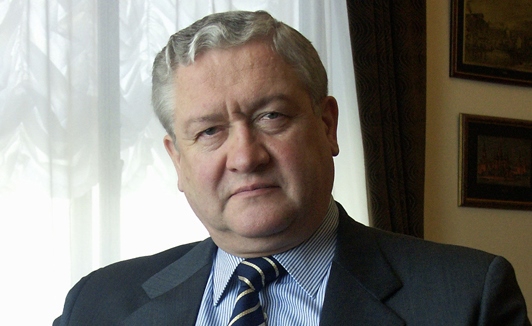Re: Regional geopolitics
Turkish minister claims ‘holy wars will soon begin in Europe’
By News Desk - 17/03/20175
Almasdar
(The Independent) BEIRUT, LEBANON (3:03 A.M.) – A Turkish minister has claimed “holy wars will soon begin” in Europe, in spite of the defeat of far-right leader Geert Wilders in the Netherlands elections.
Mevlut Cavusoglu, Turkey’s foreign minister, did not welcome the victory for Prime Minister Mark Rutte’s centre-right People’s Party for Freedom and Democracy (VVD).
“Now the election is over in the Netherlands…when you look at the many parties you see there is no difference between the social democrats and fascist Wilders,” he said according to a translation by Hurriyet.
“All have the same mentality. Where will you go? Where are you taking Europe? You have begun to collapse Europe. You are dragging Europe into the abyss. Holy wars will soon begin in Europe.”
Mr Wilders attempted to capitalise on an ongoing diplomatic row between the Netherlands and Turkey during his election campaign, leading a small protest outside the country’s embassy and calling Mr Erdogan a “dictator”.
His anti-Islam Party for Freedom came second in the Dutch election with 20 seats, compared to 33 for Mr Rutte’s VVD, and is likely to be excluded from coalition talks.
French presidential candidate Emmanuel Macron hailed the result as a victory for “progressives”, while German Chancellor Angela Merkel called Mr Rutte to congratulate him overnight.
The dispute over political campaigning for a constitutional referendum in Turkey has intensified since a rally to be held by Mr Cavusoglu in Rotterdam was cancelled on Saturday.
Dutch authorities withdrew permission for the foreign minister’s plane to land when he vowed to visit the country regardless, sparking a series of tit-for-tat sanctions.
President Recep Tayyip Erdogan and prominent ministers have called the Dutch government “fascists” and “Nazis”, while EU leaders have called the allegations offensive and “detached from reality”.
Turkish hackers spread the Nazi accusations across high profile Twitter accounts on Wednesday morning, posting pro-Erdogan messages and a link to the President speaking from accounts including Unicef USA, Amnesty International, BBC North America, Forbes and Justin Bieber’s Japanese account.
“A little bit of an Ottoman Slap to you, see you on 16 April,” read the identical tweets, using the hashtags #NaziGermany and #NaziHolland.
The dispute has sparked protests in Turkey and across Europe, while Turkish-backed rebels in Syria put out a video accusing the Dutch government of being swayed by the ideology of Mr Wilders’ “xenophobic and racist” Party for Freedom (PVV).
Turkish minister claims ‘holy wars will soon begin in Europe’
By News Desk - 17/03/20175
Almasdar
(The Independent) BEIRUT, LEBANON (3:03 A.M.) – A Turkish minister has claimed “holy wars will soon begin” in Europe, in spite of the defeat of far-right leader Geert Wilders in the Netherlands elections.
Mevlut Cavusoglu, Turkey’s foreign minister, did not welcome the victory for Prime Minister Mark Rutte’s centre-right People’s Party for Freedom and Democracy (VVD).
“Now the election is over in the Netherlands…when you look at the many parties you see there is no difference between the social democrats and fascist Wilders,” he said according to a translation by Hurriyet.
“All have the same mentality. Where will you go? Where are you taking Europe? You have begun to collapse Europe. You are dragging Europe into the abyss. Holy wars will soon begin in Europe.”
Mr Wilders attempted to capitalise on an ongoing diplomatic row between the Netherlands and Turkey during his election campaign, leading a small protest outside the country’s embassy and calling Mr Erdogan a “dictator”.
His anti-Islam Party for Freedom came second in the Dutch election with 20 seats, compared to 33 for Mr Rutte’s VVD, and is likely to be excluded from coalition talks.
French presidential candidate Emmanuel Macron hailed the result as a victory for “progressives”, while German Chancellor Angela Merkel called Mr Rutte to congratulate him overnight.
The dispute over political campaigning for a constitutional referendum in Turkey has intensified since a rally to be held by Mr Cavusoglu in Rotterdam was cancelled on Saturday.
Dutch authorities withdrew permission for the foreign minister’s plane to land when he vowed to visit the country regardless, sparking a series of tit-for-tat sanctions.
President Recep Tayyip Erdogan and prominent ministers have called the Dutch government “fascists” and “Nazis”, while EU leaders have called the allegations offensive and “detached from reality”.
Turkish hackers spread the Nazi accusations across high profile Twitter accounts on Wednesday morning, posting pro-Erdogan messages and a link to the President speaking from accounts including Unicef USA, Amnesty International, BBC North America, Forbes and Justin Bieber’s Japanese account.
“A little bit of an Ottoman Slap to you, see you on 16 April,” read the identical tweets, using the hashtags #NaziGermany and #NaziHolland.
The dispute has sparked protests in Turkey and across Europe, while Turkish-backed rebels in Syria put out a video accusing the Dutch government of being swayed by the ideology of Mr Wilders’ “xenophobic and racist” Party for Freedom (PVV).








Comment